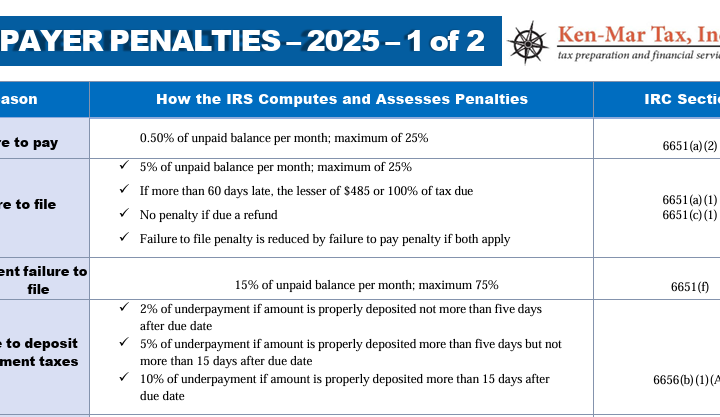If you started a business in 2024 pay attention to these new BOI Report requirements:
If, in 2024, you start a small business or buy a rental property using a new limited liability company (LLC), you can trigger the need to file new federal reports and keep them up to date.
Take BOI Report Requirements Seriously
The penalties for non-compliance with the requirements to file the newly required reports can be severe. First, there are civil penalties of up to $500 for each day that a violation continues. Second, there are also potential criminal penalties—a fine of not more than $10,000 and imprisonment for up to two years for any person who willfully:
- provides, or attempts to provide, false or fraudulent beneficial ownership information, or
- fails to report complete or updated beneficial ownership information to FinCEN.
If you get this wrong, you can avoid civil or criminal liability by submitting a corrected report within 90 days.
Summary of CTA Reporting / BOI Report Requirements
This important requirement is summarized in 5 key points below:
1. The CTA reporting begins for small businesses formed in 2024.
2. If your newly formed 2024 business entity is not exempt, you must file a BOI report with FinCEN within 90 days after the entity is formed.
3. The BOI report must disclose the identities and contact information of all of the entity’s beneficial owners—the humans who either control 25 percent of the ownership interests in the entity, or exercise substantial control over the entity.
4. The BOI report must also disclose the names and contact information for the company applicants: one or two individuals who filed the documents to form the entity.
5. The BOI report is filed online in the new FinCEN BOSS database. There is no filing fee, and the report never expires. But if the information in the report changes, you must update it within 30 days.
Read the remainder of this article for details and contact Ken Mar Tax with any questions.
FinCEN: What Is This New Small Business Filing?
The Corporate Transparency Act (CTA) enacted in 2021 adds this entirely new 2024 online federal filing requirement when most small business corporations and LLCs file with their secretaries of state.
Under this requirement, you file the following two reports at the same time with the Department of the Treasury’s Financial Crimes Enforcement Network (FinCEN):
- A “beneficial owner” information report (BOI report)
- A company applicant information report
This new federal filing is totally separate from state and local filings. From now on, determining whether this filing is required, and completing it within the deadline, must become a routine part of forming most new corporations and LLCs.
Here’s a step-by-step approach:
Step 1: Is Your Entity a Reporting Company?
The CTA applies only to “reporting companies.” If the entity you’re forming is not a reporting company, you don’t have to worry about the CTA.
Unfortunately, almost all small businesses are reporting companies.
Subject to some significant exemptions, the CTA applies to business entities that are formed by filing a document such as articles of incorporation or organization with a secretary of state office or similar official.
This includes:
- LLCs
- corporations
- limited partnerships in most states, and
- limited liability partnerships.
Sole proprietors: The CTA does not apply to sole proprietors, because no document need be filed to legally establish a sole proprietorship. You simply start a business you own yourself.
Single-member LLCs: The CTA applies to individual business owners who form one-member LLCs to operate a business, even though that single-member LLC is taxed as a sole proprietorship (a “disregarded entity”). Reason: you must file a document (usually called articles of organization) with the secretary of state to form a one-member LLC, just as you must for multi-member LLCs.
Rental property: Many individuals form LLCs to own their rental properties. The newly formed 2024 LLCs trigger the CTA reporting requirements.
General partnerships: The CTA does not apply to general partnerships, except in a few states such as Delaware where general partnerships must make a state filing to come into existence. In states where the general partnership filing is optional and the partnership makes the filing, it must file the BOI.
Business trusts: Most business trusts are not reporting companies since no government filings are required to create them. But there are exceptions, such as Delaware statutory trusts.
Foreign corporations: The CTA also applies to foreign corporations, LLCs, and other entities that register to do business in the U.S. This is ordinarily done by filing a document with the state’s secretary of state.
Small businesses: Not all LLCs, corporations, or other business entities are subject to the CTA. Its focus is on smaller businesses that are not already heavily regulated by the federal government. FinCEN estimates that of the approximately 5,616,000 new businesses that are formed each year, about 617,894 will be exempt.
The broadest exemption is for “large operating companies.” These are businesses with
- more than 20 full-time employees (those who work more than 30 hours per week),
- $5 million in domestic gross receipts or sales on their prior-year tax return, and
- a physical presence in the U.S.
Newly formed businesses without a prior-year tax return won’t qualify for this exemption. But they could become exempt in future years.
Other exempt entities. In addition, the CTA does not apply to:
- publicly traded corporations and other business entities that issue securities registered with the SEC;
- investment funds, investment advisors, registered broker-dealers, banks, registered money transmitting businesses, credit unions, insurance companies, and registered public accounting firms; and
- tax-exempt non-profits, including Section 501(c)(3) corporations, and Section 527 political organizations.
Any entity wholly owned, directly or indirectly, by an exempt entity is also exempt.
Thus, for example, if a large operating company that is a corporation forms a wholly owned subsidiary corporation, that subsidiary is exempt.
Step 2: Identify the Entity’s Beneficial Owners
The CTA requires businesses to identify and provide contact information for their beneficial owners. This information is placed in the FinCEN Beneficial Ownership Secure System (BOSS) database for use by law enforcement, the IRS, and other government agencies. FinCEN does not publicly disclose the BOSS information.
The beneficial owners are the human beings who actually own and/or control a reporting company. A beneficial owner can’t be a business entity such as an LLC or corporation. If a reporting company is owned by a business entity, the human owners of that entity must be listed as the beneficial owners, not the entity.
There are two types of beneficial owners:
- The humans who own or control at least 25 percent of the ownership interests in the company
- The humans who exercise substantial control over the company
“Ownership interests” means, for example, an LLC’s membership interests or a corporation’s shares of stock. For most businesses, identifying the beneficial owners is simple. For example, a three-member LLC in which each member has a one-third ownership interest has three beneficial owners.
Likewise for a four-shareholder corporation in which each shareholder owns 25 percent of the corporate stock.
For reporting companies with complex ownership structures, determining the 25 percent-or-more owners can be more difficult. All types of ownership interest must be compared with all outstanding ownership interests. For LLCs or limited liability partnerships, the 25 percent owners are determined by comparing an individual’s capital or profits interest with the total outstanding capital and profit interests of the entity.
But there is a default rule: any individual who owns or controls 25 percent or more of any class or type of ownership interest of a reporting company is deemed a beneficial owner.
Things can get even more complicated if there are individuals who don’t own a 25 percent-or-more interest but who exercise substantial control over the company. For example, if an LLC has a manager who owns less than 25percent of the LLC, that person would still be a beneficial owner because the LLC’s manager exercises substantial control over the entity.
Substantial control. The definition of “substantial control” is breathtakingly broad. It includes:
- senior officers—a corporation’s president, chief financial officer, general counsel, chief executive officer, chief operating officer, or any other officer who performs a similar function (typically not secretary or treasurer);
- individuals who have authority over appointment or removal of senior officers or directors of a corporation or the managers and members of an LLC;
- individuals who direct, determine, or have substantial influence over important decisions—for example, entering into new lines of business; reorganizing, dissolving, or merging the company; selling principal assets; incurring substantial debt; determining compensation for senior officers; and amending any governance documents; and
- any other person who has substantial control (direct or indirect) over the company.
For companies with complex ownership or governance structures, it may be necessary to review the governing documents to determine all the individuals with substantial control. These may include corporate bylaws, LLC operating agreements, and any other documents that grant special voting rights, such as shareholder agreements.
And even this may not be enough because, even in the absence of a formal written document, substantial control may be exercised through informal understandings or relationships.
A good rule of thumb: if you’re not sure whether a person exercises substantial control but the person might do so, list the person in the BOI report.
Exemptions: Individuals who would otherwise qualify as beneficial owners may be omitted from the BOI report if they are
- minor children (provided their parent or legal guardian is listed);
- individuals acting as a nominee, intermediary, custodian, or agent on behalf of another individual(provided the individual for whom the agent or nominee acts is listed);
- employees other than senior officers;
- heirs of company owners; or
- creditors of a reporting company, unless the creditor is a beneficial owner based on substantial control or ownership or control of 25 percent or more of the ownership interests.
Step 5: File BOI Report within 90 Days
The BOI report must be filed within 90 days after a new business entity is formed—that is, 90 days after the formation document is filed.
The BOI report is filed online, in the new FinCEN BOSS database. Filings can’t be made until January 1, 2024. There is no filing fee.
In addition to the information for the beneficial owners and company applicants, the BOI report must contain the following information for the business entity itself:
- Legal name (and any trade name or dba)
- Address of principal place of business (can’t be a PO box or office of formation/registered agent)
- State or jurisdiction of formation
- IRS taxpayer identification number
Step 6: File Updated BOI Reports
For many small businesses, this will be a one-and-done filing. The BOI filing need not be renewed or updated unless the information on the BOI report changes. If there is a change in the information on the BOI report, an updated report must be filed within 30 days of the change.
Exempt entities that are no longer exempt are required to submit a BOI report not later than 30 days after their exemption ceases.
Business Governing Documents Should Address CTA
The governing documents for all but one-owner businesses, such as one-member LLCs or one-shareholder corporations, should mandate that all beneficial owners comply with the CTA’s requirement.
For more details visit the Financial Crimes Enforcement Network page on BOI: https://www.fincen.gov/boi/Reference-materials
Small Business Tax Services
As an expert in small business tax services and tax consulting Ken-Mar Tax eats, sleeps and breathes small business tax strategies. Being an enrolled agent allows founder, Ken Weinberg, to represent you to the IRS - something only a CPA, tax attorney and Enrolled Agent can do. EAs are the only federally licensed tax practitioners who specialize in taxation and also have unlimited rights to represent taxpayers before the IRS. It also means he is continuously being updated on the new IRS tax codes and taking classes from the IRS that provide guidance on how to file returns so that they are not "flagged."
When you get your taxes prepared by Ken Mar Tax you also have the option to purchase the Tax Audit Protection Plan to avoid the extra costs of paying for audit representation. If you are audited by the IRS, State of Ohio or local taxing authorities, Ken-Mar Tax will meet with the taxing authorities on your behalf to negotiate a settlement for you. The fee covers all costs up to the Appeals level, including up to 15 hours of correspondence with the auditing party – either the IRS, State of Ohio or locality.




